Traveling to Munich and Bavaria;
let me help you plan your travel holiday as your private tour guide
on several day trips, in Munich & Bavaria.
Please click here to visit Johns Bavarian Tours, then you will see the many other tours which are offered.
-

-
History of the city of Munich up to today!
-
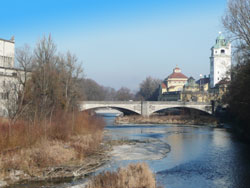 Early days of Munich
Early days of Munich
Munich first began to change from a tiny village to a city in the 7th century. Benedictine monks from Scotland and Ireland who had been living at the lake Tegensee founded a tiny new monastery nearby the river Isar in 777.
The river Isar was a major trade route for salt coming from Salzburg going to Augsburg. A bridge on the river in Friesing was used by a local bishop as a toll station for the passing boats. In 1156 the ruler of Bavaria (Duke Henry the Lion) decided that he should collect this toll, so he burned down the bridge owned by Bishop Otto von Freising; then he built his own bridge in Munich near the city center. This bridge was, built near a small community of Benedictine Monks, being referred to as "bei Mönchen", the monks' place. So the Munich's town name was created; a monk remains as the symbol of Munich today! On June 14th 1158 the Duke, "Henry the Lion", officially granted the settlement of Munich the right to hold a market, thus making it a true city.
-
 The Royal Family Wittelsbach
The Royal Family Wittelsbach
In the early 1500s Munich had a population of around 14.000. Residents were mixture of many religions and cultures of many different backgrounds. The ruling family of the Wittelsbach funded many public projects. Their desire was to make Munich a second Paris, including: museums, libraries, universities and parks. This cultural movement would last over 400 years.
Part of these cultural happenings included the first laws in Europe with regulation concerning food and drink; the Bavarian Beer Purity Law of 1514 is still enforced today.
-
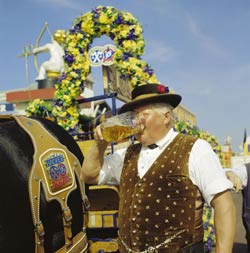 The Oktoberfest
The Oktoberfest
In 1810 the Crown Prince Ludwig of the Wittelsbach family who became King Ludwig I was engaged to be married. He invited the entire city of Munich to celebrate with him on this occasion. A two week wedding reception party was then planned.
This party was so popular that it was first repeated in 1826; it was decided to declare this as a local tradition. That would be held every year at the same time. This is now known worldwide as the Oktoberfest. Being one of the largest festivals in the world, Munich attracts more people every year. It has been estimated that over 7 million beer drinking visitors come to Munich for two and halve weeks each year in the fall.
Maximilian II became King after his father, Ludwig I, was forced to step down because of his being seen in public with the dancer Lola Montez.
-
 Maximillian II and Ludwig II
Maximillian II and Ludwig II
In 1864 Maximilian II died of blood poisoning. Ludwig II was only eighteen years old when his father died, his new title King Ludwig II of Bavaria. Ludwig invited the composer Richard Wagner to court and became his patron, making plans to built Wagner an opera house in Munich. The parliament was against this project from the very beginning. Ludwig II was never happy in Munich he much preferred to stay in the Alps. King Ludwig II was force to deal with two difficult situations during his reign; one the war with France, and two the war with Prussia.
Ludwig spent most of his time and all of his money building castles, which all the world wants to see even today. In June of 1886 Ludwig II was stripped of his titles and forced to step down as King.
After his transport by coach and horse from Neuschwanstein Castle to the family villa on the lake of Starnberg near Munich, Ludwig II would be found drowned with his Doctor. What really happened that night has never been proven; there are many theories. There are no witnesses or proven conclusive evidence.
Please visit my Ludwig tour (5.) on my website, for much more information about Ludwig II of Bavaria.
Ludwig's uncle Prinzregent Luitpold was his replacement of royal power, even before his death. He would remain in power until he was 92 years old. Luitpold's son at 65 was the last King of Bavaria. Ludwig III found himself in difficult times. These situations lead to extreme poverty and even starvation throughout Bavaria.
-
 World War I & II
World War I & II
After the end of WWI the city of Munich was a very conservative place. Political extremist found a welcome audience here for their political ideas and organizations. In 1914, life in Munich became very difficult. The Allied forces blocked most delivery of food and fuel to the city. During French air raids in 1916 three bombs fell on Munich. In November 1918 on the eve of revolution, Bavaria's last King Ludwig III was forced to leave Bavaria marking the end of 800 years of his family rule; shortly after the beginning of WWI took place.
The first elected premier Kurt Eisner would be murdered in February 1919 by Anton Graf von Acro Valley; he got away with this act completely. A Bavarian Soviet Republic was then founded; but the Soviet Republic was stopped on May 3, 1919. Then a republican government was restored, thus creating a boiling pot of right wing politics in Munich.
In 1923 Hitler's Putsch would be halted by the Munich Police next to the Feldherrnhalle; Munich became the capital of the Nazi movement. The National Socialist took power in March of 1938 marking the beginning of WW2.
-
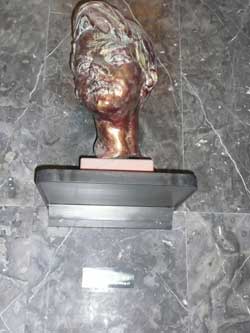 Dachau Concentration Camp
Dachau Concentration Camp
The National Socialist Workers Party founded the first concentration camp Dachau, only 30km from Munich located near the old market village of Dachau. Due to the importance of the National Socialism movement Munich would be called the "Capital of the Movement". The headquarters were in Munich and many of the buildings built by Hitler are still standing today in the city center.
White Rose
Between June 1942 and February 1943, a group of students formed a movement called the White Rose. All the important founders were arrested and executed after pushing leaflets down from the upper most balconies in the University main building. The brother and sister pair Hans and Sophie Scholl refused to cooperate with the Nazis, causing their execution.
You may visit a small memorial museum in their honor, located in the University which is open to the public. There are many interesting places to visit in Munich in relation to this period of history.
Most of the intercity of Munich was lost; it is said that Munich was bombed 71 times during 6 years of bombing. About 250.000 people died in the bombing; of the 10.000 Jews only 200 lived through the war. Ninety percent of the buildings were completely destroyed, thus leaving a large gaping hole. One could see through from one side of the city to the other.
For those interested I have made a special tour concerning Jewish Life in Munich.
I will also be happy to show you the places concerning the Movement of the White Rose.
For those interested in this Munich's darkest time in history, there is an abundance of places to be visited.
On a special city tour I will be happy to point out the many places where the events of WWII took place. Please ask about my Munich Historical Tour, which can be focused on Hitler and WWII.
Nearby Munich is Dachau Concentration Camp this is also a very special tour I offer my clients.
Visit my special Dachau website for more detailed information. You will also find a Dachau tour on my website under tours 1. and 2.
Munich like the Phoenix raising from the ashes; the people of the city were fast in re-building it. So it was reborn out of the ashes and rumble of the WWII. Today you will find very little signs of the war. Ask me and I will show you the many bullet holes that can still be found in the buildings and bronze sculptors.
After the Americans occupied Munich in 1945, Munich was completely rebuilt by its citizens who all worked very hard, to rebuild their city in record time.
-
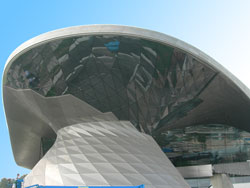 Modern Times
Modern Times
The 1972 Olympics help the city to build an underground system and even an Olympic Park which is still in use today. Unfortunately this was also the site of the first terror attack of modern times; when the Palestine terrorist killed all but one of the Israeli athletes.
Munich grew quickly as an International Center with the opening of a large International Airport in 1992 followed by an enlargement of a second terminal in 2003.
At the site of the old Munich airport Riem, a large new convention center "Neue Messe" was opened in 1998.
The "Pinakothek der Moderne" opened in 2002, a museum of design housing very famous artworks from the Impressionist through to today.
After all that happened to the Jews during WWII; Munich now has a new Synagogue located in the city centre; Ohel Jakob Synagogue. The Synagogue was inaugurated November 9, 2006. The following year a Jewish Museum opened next to the Synagogue.
Munich hosted the opening of the World Soccer Championship in 2006; held in the new Alliance Arena, built especially for these games.
More than two years of construction were needed for BMW to complete a brilliant new delivery center which opened in 2007. My personal tour of this architectural gem is one of the highlights of my Munich city tour.
In 2008 Munich celebrated its Birthday of 850 years, for a total of 3 months!
Munich newest Modern Art Museum; The Brandhorst Collection will open to the public April 27, 2009.
-
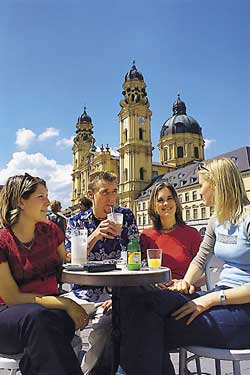 A few facts you may find interesting
A few facts you may find interesting
- Munich's motto: Munich loves you / The World city with a Heart!
- The name Munich really means Monk.
- Coat of Arms are Black and Gold being the colors of the Holy Roman Empire.
- The population is about 1.3 million but during the Oktoberfest climbs to 8 million.
- The closest skiing area is Garmisch about 120km south of the city.
- The highest mountain in Germany is the Zugspitze 2962 meters high located in Garmisch.
- Munich has a continental climate, influenced by the Alps.
- The city's altitude and its relation to the Alps creating a atmosphere, where rain is more frequent.
- The temperature changes between daytime and night-time, or summer and winter can be extreme. A warm downwind from the Alps (a föhn wind) can change the temperatures and weather completely.
- Winters last from Nov to the end of March but it can snow in Sept.
- Summers are short and not usually very hot.
- I always say dress like an onion.
- In Munich you can always ask the younger generation questions, they love to speak English.
- Lastly a good rate for tipping is 10%; with smaller bills in restaurants under 10 Euro you can round off the sum.
-


 Early days of Munich
Early days of Munich The Royal Family Wittelsbach
The Royal Family Wittelsbach The Oktoberfest
The Oktoberfest Maximillian II and Ludwig II
Maximillian II and Ludwig II World War I & II
World War I & II Dachau Concentration Camp
Dachau Concentration Camp Modern Times
Modern Times A few facts you may find interesting
A few facts you may find interesting